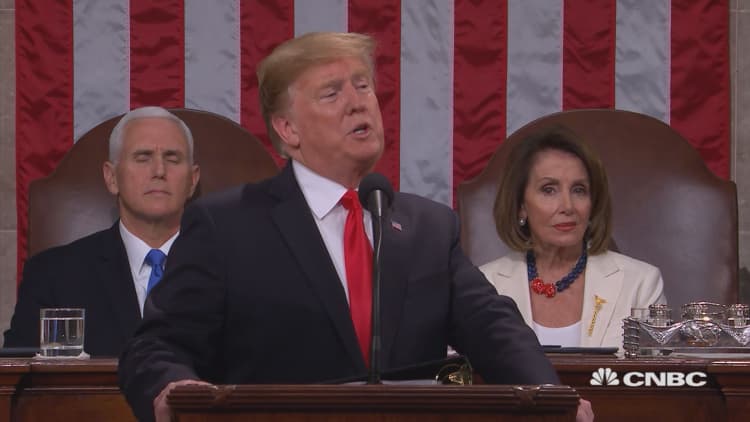
President Donald Trump wants to make a familiar political bogeyman part of his 2020 re-election bid.
Trump's State of the Union address Tuesday night sounded a lot like a stump speech. He listed what he considers his accomplishments and repeated his campaign promise to build a border wall. Trump also derided what he cast as a drift toward "socialism" in the Democratic Party.
"Here, in the United States, we are alarmed by new calls to adopt socialism in our country. ... Tonight, we renew our resolve that America will never be a socialist country," the president said, prompting applause from congressional Republicans who stared toward the Democratic side of the House chamber. House Speaker Nancy Pelosi, sitting behind Trump, also applauded.
In the Democratic-held House, more members have embraced largely popular policies such as Medicare for all, free public college and tax hikes on the wealthy. Trump and the GOP have tied the party to an economically ravaged Venezuela, despite the fact that lawmakers have not called for majority or full state ownership of companies like in the South American country.
Facing low approval ratings, various probes and a failure to accomplish some of his key campaign goals ahead of his November 2020 re-election bid, the president appears intent on stirring fears about the political ideology. A Trump campaign spokesman said that the rhetoric about socialism "resonates with the vast majority of hard working Americans who recognize that Trump's patriotic capitalism is benefiting all Americans nationwide."
Still, it is unclear whether Trump's attacks will work. Plus, the Democratic Party's left wing may have the public on its side with at least a few economic issues.
A few lawmakers such as freshman Rep. Alexandria Ocasio-Cortez, D-N.Y., and Sen. Bernie Sanders, I-Vt., identify as democratic socialists. They have become favorite targets for Republicans as the GOP tries to cast all Democrats as too radical for mainstream America. In Ocasio-Cortez's mind, Trump's criticism shows concern about the popularity of policies embraced by the left.
"I think he's scared," the representative told reporters Tuesday night, according to The Hill. "He sees that everything is closing in on him and he knows that he's losing the battle on public opinion."
Indeed, a Hill-HarrisX poll this month found 53 percent of registered voters would be more likely to back a presidential candidate who supports Medicare for all. Even Trump has called for universal health care in the past.
Since taking the majority and speaker's gavel back last month, Pelosi has had to manage an ideologically diverse caucus. Her applause after Trump's socialism line reflects a push to portray a Democratic Party that has not drifted too far left, despite its focus on key issues for the liberal base. Democrats represent — and aim to keep — dozens of House seats either split ideologically or leaning Republican.
For instance, Pelosi and other party leaders have tread lightly around Medicare for all. They have pushed to improve Obamacare, or the Affordable Care Act as it's formally known, and strengthen its popular provisions instead of calling for a more dramatic overhaul of the health-care system.
Still, Trump's complaints about government power will not disappear as many of his potential 2020 opponents call to expand public health care. Just how effective the rhetoric is remains to be seen.
Republicans have tied Democratic lawmakers to socialism for decades. Critics have cast expansions of state power, from the New Deal to the Affordable Care Act, as moves toward government control of just about everything.
For decades, Russia was the socialist bogeyman. Now, it's Venezuela.
Before the 2018 midterms, the White House issued a 72-page document warning that policies such as Medicare for all would turn the U.S. into "the next Venezuela." The House Republican campaign arm also rejected its foes as too radical for the U.S. public.
Democrats went on to gain a net 40 House seats, largely focusing on protecting health-care coverage in an election marked largely by Trump's poor approval rating. Cole Leiter, a spokesman for the House Democratic campaign arm, said the party is "working to support and grow the middle class."
"Let's face it — Republicans in Washington have embraced name calling as a tactic before, and in 2018 it netted them a negative 40-seats in the United States House of Representatives," Leiter, a spokesman for the Democratic Congressional Campaign Committee, said in a statement.
Strong dislike of the president threatens to sink him personally this time. He has only about a 41 percent approval rating, versus 55 percent disapproval, according to a RealClearPolitics average of recent polls.
On Tuesday night, Trump touted his main electoral selling point to the American public: a strong U.S. economy. Treasury Secretary Steven Mnuchin echoed his rhetoric in a CNBC interview on Wednesday.
"The U.S. economy is doing terrific," the Treasury secretary said. "And as the president talked about last night, his economic plan is working. We're not going back to socialism."
Mnuchin said that "we don't believe in a centralized planning economy where the government puts restraints on it." However, Trump has repeatedly used public pressure to try to bend companies to his will.


